2018 ELECTION UPDATE:
(with general election results):
| Kansas 2018 Mid-Term Election Results |
|
per KAKE-TV Nov. 5, 2018 |
|
with at least 98% of votes counted |
|
|
|
|
1 |
|
RED = REPUBLICAN |
|
|
|
BLUE = DEMOCRAT |
|
|
|
* = incumbent |
|
|
|
|
|
|
|
|
CANDIDATES |
VOTES |
% |
PERCENTAGE of VOTES |
|
|
cast |
|
|
|
STATE-WIDE OFFICES: |
|
|
|
|
|
|
|
Governor |
|
|
Laura Kelly |
487,804 |
48% |
|||||||||||||||||||||||||||||||||||||||||||||||| |
|
Kris Kobach |
441,446 |
43% |
||||||||||||||||||||||||||||||||||||||||||| |
|
Greg Orman |
65,754 |
6% |
|||||| |
|
Jeff Caldwell |
18,288 |
2% |
|| |
|
Rick Kloos |
6,200 |
1% |
| |
|
|
|
|
|
|
Secretary of State |
|
|
Scott Schwab |
534,172 |
53% |
||||||||||||||||||||||||||||||||||||||||||||||||||||| |
|
Brian McClendon |
439,978 |
44% |
|||||||||||||||||||||||||||||||||||||||||||| |
|
Hodgkinson |
35,369 |
4% |
|||| |
|
|
|
|
|
|
Attorney General |
|
|
Derek Schmidt* |
597,000 |
59% |
||||||||||||||||||||||||||||||||||||||||||||||||||||||||||| |
|
Sarah Swain |
409,609 |
41% |
||||||||||||||||||||||||||||||||||||||||| |
|
|
|
|
|
|
Treasurer |
|
|
Jake LaTurner* |
581,382 |
58% |
|||||||||||||||||||||||||||||||||||||||||||||||||||||||||| |
|
Marci Francisco |
420,000 |
41% |
||||||||||||||||||||||||||||||||||||||||| |
|
|
|
|
|
|
Insurance Commissioner |
|
|
Vicki Schmidt |
625,882 |
63% |
||||||||||||||||||||||||||||||||||||||||||||||||||||||||||||||| |
|
Nathaniel McLaughlin |
364,308 |
47% |
||||||||||||||||||||||||||||||||||||||||||||||| |
|
|
|
|
|
|
|
|
|
|
|
CONGRESSIONAL DISTRICTS: |
|
|
|
|
|
|
|
FIRST |
|
|
Roger Marshall* |
149708 |
68% |
|||||||||||||||||||||||||||||||||||||||||||||||||||||||||||||||||||| |
|
Alan Lapolice |
69076 |
32% |
|||||||||||||||||||||||||||||||| |
|
|
|
|
|
|
SECOND |
|
|
Steve Watkins |
124895 |
48% |
|||||||||||||||||||||||||||||||||||||||||||||||| |
|
Paul Davis |
120421 |
46% |
|||||||||||||||||||||||||||||||||||||||||||||| |
|
|
|
|
|
|
THIRD |
|
|
Sharice Davids |
164253 |
53% |
||||||||||||||||||||||||||||||||||||||||||||||||||||| |
|
Kevin Yoder |
136104 |
44% |
|||||||||||||||||||||||||||||||||||||||||||| |
|
Chris Clemons |
7643 |
2% |
|| |
|
|
|
|
|
|
FOURTH |
|
|
Ron Estes* |
136,281 |
60% |
|||||||||||||||||||||||||||||||||||||||||||||||||||||||||||| |
|
James Thompson |
92,029 |
40% |
|||||||||||||||||||||||||||||||||||||||| |
|
|
|
|
|
|
|
|
|
|
|
SEDGWICK COUNTY COMMISSION: |
|
|
|
|
|
|
District 1 |
|
|
Pete Mietzner |
19364 |
53% |
||||||||||||||||||||||||||||||||||||||||||||||||||||| |
|
Renee Duxler |
16975 |
47% |
||||||||||||||||||||||||||||||||||||||||||||||| |
|
|
|
|
|
|
District 2 |
|
|
Lacey Cruse |
16138 |
55% |
||||||||||||||||||||||||||||||||||||||||||||||||||||||| |
|
Richard Ranzau* |
13024 |
45% |
||||||||||||||||||||||||||||||||||||||||||||| |
|
|
|
|
|
|
District 5 |
|
|
Jim Howell* |
14688 |
56% |
|||||||||||||||||||||||||||||||||||||||||||||||||||||||| |
|
Jim Skelton |
11537 |
44% |
|||||||||||||||||||||||||||||||||||||||||||| |
|
|
|
|
|
|
|
|
Return to 2018 Election menu
OVERVIEW of 2018 ELECTION:
In 2018, Kansas politicians were campaigning for local, state and federal office.
In the Wichita area, most races pit well-funded establishment incumbents (mostly Republican) -- against less-experienced politicians or complete novices (mostly Democrats).
In fact, in several races, the principal challengers have had no prior political experience at all, and no political track record on which to judge them.
However, most of the incumbents have been attached to exceptional controversy, and are vulnerable accordingly.
For voters in the Wichita area, these races include, principally:
LOCAL contests:
- County Commission,
Sedgwick County
Three of the five County Commissioners' seats are up for a four-year term. The County Commission has been mired in controversy and conflict for several years, and recent events have added serious legal issues.
One of three Commissioners (Michael O'Donnell) became the focus of an FBI investigation into alleged campaign-finance abuses and associated money-laundering.
Three Commissioners (Unruh, Dennis and O'Donnell) sought to fire the County Manager for speaking with the FBI about the matter -- initially acting on legal guidance from County Counselor Eric Yost (himself a former controversial conservative politician and judge), which Yost later reversed, warning such actions might violate federal whistle-blower protection laws.
Attempts by the trio of commissioners to confer in secret on the matter have been thwarted by the state's Open Meetings law which requires all public board actions and discussions to be in public -- except when discussing certain specific types of matters, particularly personnel matters and pending litigation -- and required all decisions to be made only in the presence of four out of the five commissioners (a "quorum").
Opposing Commissioners Ranzau and Howell refused to participate in the secret ("Executive") sessions, arguing against their legality, and their absence prevented a quorum from being present to allow a lawful vote on the matter. In response, at the next gathering of a quorum of four, the three other commissioners simply voted to permanently change the quorum requirement to three commissioners.
About this time, Ranzau and others revealed an FBI inquiry into the Commission's conduct, which, as of late October, 2018, remains indeterminate.
The county commissioners up for re-election appeared to be mainly facing weak, under-funded opponents, who have little or no political experience -- except for former Wichita City Councilman and former County Commissioner Jim Skelton.
However, the outcomes were not entirely so obvious.
See:
(NOTE: For more on the County Commission, see the LOCAL GOVERNMENT section, below. For more on Local Elections, see LOCAL ELECTIONS section, below.)
Return to 2018 Election menu
STATE contests:
-- and each are described below.
Return to 2018 Election menu
Governor:
This race initially was a huge battle among several leading Republicans and Democrats, vying for their party's nomination -- but quickly settled down to a tight race between two conservative Republicans, incumbent Governor Jeff Colyer and Kansas Secretary of State Kris Kobach. Kobach barely won -- by less than half a percent (the tightest gubernatorial primary in state history).
Republican Secretary Kobach faces a liberal Democrat State Senator Laura Kelly, and an independent candidate, businessman Greg Orman. As of late October, 2018, Republican Kobach is narrowly leading Democrat Kelly, as independent Orman trails far behind both.
Chief among Republican Kobach's arguments are his anti-immigrant and voter-suppression credentials, and an in-person endorsement from President Trump, whom he briefly served in a minor political post (see below), and his commitment to revive the controversial tax-cuts of Colyer's predecessor, Gov. Sam Brownback. Brownback's controversial extreme tax-cuts had wrought havoc with the state's finances, education and economy, and resulted in a massive backlash from his own party.(see below).
Democrat Kelly counters by framing the Kobach candidacy as a way back to the extreme policies of unpopular former Gov. Brownback, whom she opposed. And she particularly promises "adequate" funding to education (about half of the state budget) -- a topic that resonates across party lines in Kansas. (Conservative rural Kansas communities, dying out as farm automation drives their young to work in the cities, see their state-supported schools as the hub of community life, and the "last critical institution" that defines a rural community as a town.)
Moderate political Independent Greg Orman -- a rich businessman who has never served in public office -- has found support from the state's largest trade organization, the Kansas Farm Bureau , and its former leader, the campaign manager for Gov. Colyer's unsuccessful re-election bid. And a prominent Western Kansas Republican legislator, Bernie Doll, joined as his running mate. However, Orman is expected to take more votes away from Democrat Kelly than from Republican Kobach, and Orman may serve as a "spoiler" for Kelly's gubernatorial attempt.
However, as of late October, 2018, the race remains uncertain.
UPDATE: Nov. 5, 2018:
In the 2018 race for Kansas Governor,
State Senator
Laura Kelly (Democrat) won
with 48% of the vote --
defeating Kansas Secretary of State Kris Kobach (Republican), who got 43% of the vote -- as well as three other candidates, who split 9% of the vote (6% to independent candidate and businessman Greg Orman, 2% to Jeff Caldwell, and 1% to Rick Kloos).
(See graph below, per KAKE-TV Nov. 5, 2018, with at least 98% of votes counted:)
|
Governor |
|
|
Laura Kelly |
487,804 |
48% |
|||||||||||||||||||||||||||||||||||||||||||||||| |
|
Kris Kobach |
441,446 |
43% |
||||||||||||||||||||||||||||||||||||||||||| |
|
Greg Orman |
65,754 |
6% |
|||||| |
|
Jeff Caldwell |
18,288 |
2% |
|| |
|
Rick Kloos |
6,200 |
1% |
| |
The victory promises sweeping reversal of the unusual and controversial "Kansas experiment" of the Brownback/Colyer administration.
The Democrat candidate's victory -- the only state-wide Kansas office won by a Democrat in this election -- is widely described as
a firm statewide repudiation of both...
- arch-conservative fiscal and social policies of Governors Brownback & Colyer; and
- Secretary Kobach's own controversial voter-suppression and anti-immigrant policies, and other controversial conduct, while Kansas Secretary of State.
Return to 2018 Election menu
Secretary of State
The battle for incumbent Kris Kobach's seat -- which he is leaving in his bid for Governor -- is hotly contested between Republican and Democrat. The Republican is an establishment member of the Kobach orbit. The Democrat is a former Kansan -- a California billionaire co-founder of computer colossus Google -- who has returned to the state for his first attempt at public office.
The race is seen by analysts as extremely important, because its outcome is expected to determine the future of Kobach's extensive voter-suppression efforts, which have advantaged Republicans, and handicapped Democrats, throughout the state.
The race is largely seen as a state-wide referendum on incumbent Kobach's voter-suppression policies.
UPDATE: Nov. 5, 2018:
In the 2018 race for Kansas Secretary of State -- the Republicans retained the office, with newcomer Scott Schwab winning 53% of the vote
-- despite the incumbent Republican, Kris Kobach, losing his bid for Governor.
Democrat Brian "Bam" McClendon -- a former Kansan, recently returned from a successful career as a computer industry tycoon in California's "Silicon Valley" -- received 44% of the vote. The remaining 4% went to independent candidate Hodgkinson.
(See graph below, per KAKE-TV Nov. 5, 2018, with at least 98% of votes counted:)
|
Secretary of State |
|
|
Scott Schwab |
534,172 |
53% |
||||||||||||||||||||||||||||||||||||||||||||||||||||| |
|
Brian McClendon |
439,978 |
44% |
|||||||||||||||||||||||||||||||||||||||||||| |
|
Hodgkinson |
35,369 |
4% |
|||| |
(NOTE: For more on the Kansas state government, see the STATE GOVERNMENT section, below)
Return to 2018 Election menu
FEDERAL contest:
- U.S. Representative:
Kansas 4th Congressional District
The Kansas 4th Congressional District includes Wichita, and surrounding Sedgwick County (which hold most of the District's voters) and several surrounding rural counties in South-Central Kansas. The District has been represented by a Republican since the defeat of longtime Democrat Congressman
Dan Glickman
in 1994.
This lively race pits new Republican incumbent, former Kansas Treasurer Ron Estes, against Democrat political novice James Thompson, a civil rights lawyer -- in a rematch of their 2017 race for the seat (when it was vacated by resignation.) In that race, which was largely seen as a backlash against President Trump, Thompson nevertheless lost resoundingly, though by a narrower margin than any Democrat in decades.
In the current race, Estes' incumbent duties have kept him in Washington for much of the campaign, and he has dismissed many attempts by Thompson to engage him in debates -- Thompson showing up at a remarkable number of community events and forums throughout the District, backed by a wildly enthusiastic cadre of supporters. Eventually, Estes debated Thompson at debates arranged by some of the Wichita's major TV stations.
While Estes leads in the polls and fundraising, Thompson brags that he has gotten over 20,000 donations -- while Estes' campaign relies upon a tiny fraction of that (largely from wealthy and powerful donors). Prevailing wisdom among Kansas pundits expects the race to go to Estes, but not easily, and not with any certainty.
UPDATE: Nov. 5, 2018:
In the 2018 race for Kansas 4th District Congressman, incumbent Republican Congressman Ron Estes retained his seat, with 60% of the vote
-- against a repeat competition from Wichita attorney James Thompson (Democrat). who got the remaining 40% of the vote.
(See graph below, per KAKE-TV Nov. 5, 2018, with at least 98% of votes counted:)
|
FOURTH |
|
|
Ron Estes |
136,281 |
60% |
|||||||||||||||||||||||||||||||||||||||||||||||||||||||||||| |
|
James Thompson |
92,029 |
40% |
|||||||||||||||||||||||||||||||||||||||| |
UPDATE: mid-2019:
Former 4th District Congressional candidate, James Thompson -- the Democratic party nominee in the last two 4th District congressional races -- announced he will not be a candidate in the next Congressional race, nor in any foreseeable election for any office, owing to his battle with cancer, now in an advanced stage. Thompson, however, remained a vigorous participant in Democratic Party politics, and was a popular leading speaker at "DemoFest 2019" (the 2019 State Convention of the Kansas Democratic Party).
Return to 2018 Election menu
KEY INFORMATION SOURCE:
- The Wichita Eagle Voter Guide (for all offices)
A detailed guide to the candidates, mostly in their own words, is provided by the Wichita Eagle (Wichita's principal newspaper). A bipartisan editorial and news board develops the material from questionnaires supplied to candidates.
It lists a series of basic facts about the candidates (party, age, occupation, prior office, etc.) and candidates' answers to standard questions, put to each of them, about key issues. For the Eagle Voter Guide,
CLICK HERE.
The Eagle also published
"Election Results: August 7, 2018 Primary Election."
To view them,
CLICK HERE.
Return to 2018 Election menu
LOCAL GOVERNMENT:
Wichita's local government
chiefly divides into
three branches: City, County, & School District.
They are summarized in these topic sections below:
Basic factors shaping Wichita-area Local Government are
local elections, and the extraordinary influence of
developers and the Koch family,
detailed in these sections:
Return to page menu
Local Elections

Shifting scheduling & polls,
Official & Media Silence
& Low-and-Declining Voter Turnout:
Originally, local elections were held in the spring of "off years" (the odd-numbered years when no state or federal elections were held), but the Kansas Legislature passed legislation setting local elections on the same summer/fall schedule as state & federal elections, while still keeping them separate from state/federal races by holding local elections on odd-numbered years. It was ostensibly done to improve voter turnout.
However, the 2019 local primary election in Wichita suffered the lowest turnout in years, with only about 10% of eligible voters turning up. The 2019 local primary was almost completely ignored by local media (broadcasters preoccupied with shallow, easy cops-and-crooks stories; newspaper dwindling to insignificance), and the Sedgwick County Election Commissioner's office apparently failed to make any substantial effort at notifying the public of the event, let alone promoting participation.
With apparent increasing frequency, Sedgwick County polling places (especially in the inner city) are moved about -- resulting in voters, on Election Day, going to the same polling place as the previous election, only to find that it is closed, with no obvious notice posted to tell them where their new polling place is. Critics have alleged that it is a common practice, by Republican election commissioners nationwide, to suppress voting, particularly in Democrat-leaning neighborhoods.
Under the current Sedgwick County Election Commissioner, Republican Tabitha Lehman, and her two Republican predecessors, polling places have been consolidated, relocated, moved or under-identified (with little or no signage to indicate their location) far more often than in the previous 30 years, under Democrat and Republican Election Commissioners.
Return to LOCAL GOVERNMENT menu
Developer Influence:
A fundamental defining characteristic of Wichita-area local government -- city, county and school board -- is the dominance of the land-development industry.
It is the absolute overwhelming dominating factor in city and
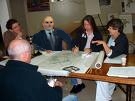 (to a slightly lesser extent) county government. (This is a nationwide phenomenon, not unique to Wichita.) While the school board is only partially affected by this, it is a costly effect there, too.
(to a slightly lesser extent) county government. (This is a nationwide phenomenon, not unique to Wichita.) While the school board is only partially affected by this, it is a costly effect there, too.
With the notable local exception of occasional local elections that the
Koch family decides to intervene in,
the campaigns of most successful candidates for city and county office (and some school board members) are funded by people in the land-development / property-management industry, because -- for them -- it is the cost of doing business. Local government has a more direct and financial impact on the development/property industry than on any other local industry, because it is local government that:
- Authorizes and restricts land developments
(through zoning, plat approvals, inspection standards, demolition permits, historic preservation policy, imminent domain acquisitions, etc.)
- Accommodates land developments, with millions of dollars (
through:
- expansion of the city (by annexation),
- development of supporting infrastructure (streets, bridges, drainage, sidewalks, water and sewer lines, etc.)
- authorization of access to those infrastructure elements (such as curb cuts for driveways)
- expansion of public safety services (police & fire),
- provision of affordable waste-disposal sites (city dumps) largely used for bulky construction and demolition waste.
- tax and finance accommodations -- ranging from revenue bonds, to TIF (tax-increment financing), to tax abatements and exemptions.
-
Directly funds the development community (particularly construction companies)
-- through major civic and public works projects (e.g.: roads, streets, highways and bridges, drainage, sewage and water service projects, stadiums, arenas, convention centers, libraries, schools, park facilities, etc.).
-
Directly underwrites risk for the development community -- by providing bailouts for unsuccessful development projects, through free or cheap added public infrastructure and public investment, tax reductions and exemptions, after-development TIF re-financing, and even outright purchase of failed properties (for instance, in recent years, the City purchased the failed Hyatt Hotel).
-
Directly sacrifices public property to private developers
-- often at bargain prices --
such as recent public-to-private property-handouts and land-grabs of numerous major city-owned buildings downtown, broad sections of the scenic riverbank, portions of Planeview, and recent proposals to commercially exploit public parks (for instance, Clapp golf course). While some of these properties are charged for, developers are almost never charged at the property's actual (often irreplaceable) long-term value to the public.
Consequently, local developers have a huge, direct financial stake in the behavior of local government, and -- as "the cost of doing business" -- developers finance candidates who they expect will be most supportive of their developments.
The development community provides most of the campaign donations to successful city and county candidates.
It also funds some school board candidates (to promote expensive school-construction projects).
The "development community" includes:
-
Land speculators, investors & developers
-
Landlords & property managers
-
Real estate brokers and their support companies
(banks, S&Ls, Credit unions, mortgage brokers, land-title companies, etc.)
-
Architects & civil engineering firms
-
Construction companies ("general contractors")
and
subcontractors (mechanical, electrical, plumbing contractors, etc.)
- ...and their support industries:
-
Material suppliers
(lumber yards, steel & concrete suppliers, etc.)
-
Equipment suppliers & operators
(bulldozers, cranes, dump trucks, etc.)
-
Financiers
(Banks, S&Ls, Credit Unions, venture capitalists)
-
Commercial Insurers
(Construction is their chief market)
-
Labor unions for the Trades
(carpenters, plumbers, electricians, etc.)
-
Developers' attorneys & accounting firms
Careful scrutiny of the campaign finance reports of local candidates finds that those industries dominate local campaign funding -- and are rewarded accordingly.
In fact, often, local candidates are, themselves, members of the development community (or members of their family are).
This causes all other local factions, industries, and individuals, to become comparatively insignificant
in the development of local government policy and operations.
It also leads to reckless development, urban sprawl, and great demands on the taxpayer
-- directly or indirectly -- to fund the projects and profits of developers and their colleagues.
Of Wichita's three principal business organizations....
- The Chamber [of Commerce] (principal export industries, like manufacturing, transportation, bankers, retailers, and large consumer-service enterprises, such as hospitals)
- WIBA (Wichita Independent Business Assn.) (small/medium sized businesses)
- WABA (Wichita Area Builders Assn.) (the development community)
...WABA absolutely exerts preeminent influence at City Hall (and some would say at the County Commission as well).
Rightly or wrongly, for local politicians, success in local politics depends upon good relations with WABA and the development community.
See:
-
County campaigns tell who's donating, how much they spent .
July 27, 2010 (Updated Aug.05, 2014)-
Wichita Eagle
-
Developers stand out in council fundraising
March 29, 2011 (Updated Aug.05, 2014)
- Wichita Eagle
-
Appearance matters on city contracts
July 17, 2012 (Updated Aug.08, 2014)
- Wichita Eagle Editorial
-
Mayoral candidates raise nearly $160,000 in past month
March 30, 2015 -
Wichita Eagle
-
Michael O’Donnell outraises Tim Norton in county race
July 29, 2016 -
Wichita Eagle
-
Slideshow: See the businesses contributing the maximum amount to candidates in Wichita’s mayoral race
Aug. 1, 2019
Wichita Business Journal
For BACKGROUND on elections for
specific local governments & elected officials,
see these sections:
For DETAILS & UPDATES on recent elections, see:
Return to LOCAL GOVERNMENT menu
City of Wichita
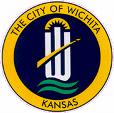
The City of Wichita has a "Council-Manager" form of government. City government is presided over by the City Council, elected from individual districts, and headed
by a Mayor elected by the voters of the City at-large.
The Council sets policy and resolves disputes with the public, but day-to-day operations of City government are handled by an appointed City Manager.
City Government TOPICS:
City Elections (Council & Mayor)
Officially the city elections are "non-partisan," and officials do not publicly declare a party affiliation, -- though moderate Republicans (especially those connected to land-development interests) tend to dominate.
Council elections are staggered -- held in the summer/fall of odd-numbered years -- with about half the council elected one year (for four-year terms), then, two years later, the reamaining council members and mayor are elected (again, for four-year terms). These staggered elections help provide some stability and continuity to the City Council, and avoid the chaos and mistakes that would result if all of the Council members were newcomers, all arriving at the same time.
UPDATE: Summer 2019:
Following years of low turnout, the 2019 local primary election in Wichita suffered the lowest recent turnout, with only about 10% of eligible voters casting ballots. The 2019 local primary was almost completely ignored by local media, and the Sedgwick County Election Commissioner's office failed to make any substantial effort at notifying the public of the event.
(For more on Local Elections & their problems, see the
LOCAL ELECTIONS section, above.)
The key race in that 2019 local primary was for Wichita Mayor.
The primary whittled down a field of several mayoral candidates to
the two finalists, who competed in the runoff (general election) in November, 2019.
For details on the latest City elections, see:
City Council Meetings
The Council meets Tuesday mornings, most weeks, for anywhere from an hour to several hours, depending upon the agenda.
Meetings are open to the public, and held in the City Council Meeting Room on the south end of the ground floor of City Hall (described below).
Council meetings are often broadcast live on the City of Wichita's cable TV channel, and videos of them are available on the City's website.
The meeting agenda -- published and available at the City Council office in City Hall, on the Thursday before the meeting -- is divided into five parts:
-
Council Agenda
(issues raised by individual council members, which can be literally anything -- from complaints about noisy neighborhoods to proposals to drastically change key city ordinances to, very often, simply making ceremonial gestures, like declarations of special days, or handing out awards),
-
Public Agenda
(issues raised by the public):
Any citizen of the city can ask to be on the agenda, and allowed to address the Council (politely), on any topic, for five minutes. The Public input though these appearances is tolerated by the Council, generally, but seldom has any substantial effect. To request being on the agenda, contact the City Council office at 268-4331, at least a week in advance (two or three is strongly recommended).
NOTE: Citizens are expected to limit their attempts to be on the agenda to only a very few times in a year, if at all (if every one of the 300,000 citizens of Wichita wanted a single 5-minute appearance on the agenda, every year, council meetings would consume 25,000 hours a year -- 68 hours a day, seven days a week.).
-
Manager's Agenda
(issues raised by the City Manager and other city officials, generally about city government administration and operations, but also about ordinances, budget and taxes, and other topics. Typical items could include approving city tax increases, reorganization of a city department, staff pay raises, purchasing new squad cars for the police, authorizing a new ordinance against smoking in public places, approving the city manager's plan to sue a non-performing vendor, funding for a new community health program, etc.)
-
Planning Agenda
(issues having to do with land management: land development and zoning, infrastructure development and maintenance -- particularly streets and utilities -- and related topics). This agenda generally governs more city tax money, and far more private expenditures, than just about any other part of the weekly council meeting, and its results can affect the city significantly for decades.
Normally, this is the most tedious, boring part of the meeting (sometimes lasting hours) -- as architects and city inspectors and engineers and land developers get up and ramble on about the importance of adding an extra lane to a half-mile of roadway, or deciding how much to charge residents of a neighborhood for a new sewer line, or reviewing a businessman's request to rezone a small plot of residential land to build a convenience store.
It should be noted that the Council usually just rubber-stamps (approves) the proposals, because they've already been approved by other entities -- particularly the joint City-County "Metropolitan Planning Commission" or MPC.
HOWEVER... because these issues can have great impact on specific individuals (often bankrupting them, or forcing them to move), and can radically change (even destroy) a neighborhood (a faulty drainage ditch can cause repeated flooding of the homes of hundreds of people), and can involve millions of dollars (adding just a mile of divided four-lane street can cost over 5 million dollars, which someone has to pay for), these agenda topics sometimes attract intense community participation at the council meetings. On rare occasions, some of the wildest council meetings erupt over items on the Planning Agenda.
-
Consent Agenda
(Routine, minor, and non-controversial technical administrative issues, like approving the minutes of the prior meeting, voting to "receive and file" routine reports of various agencies and officials, authorizing a vendor bid approval according to standard criteria; approving minor adjustments to accounting protocols; authorizing minor name changes to city agencies, etc. NOTE, however: If a member of the City Council wishes, they can have an item removed from the Consent Agenda, at the start of the meeting, and transferred to the Council Agenda, where debate and public input are allowed.)
-
Executive Session
State law (KOMA - Kansas Open Meetings Act) requires most deliberations of the City Council to happen in open meetings, open to the public. However, KOMA allows certain issues to be discussed in secret, closed-door sessions. Those include:
-
personnel matters
(such as debating whether to fire a city employee),
-
pending litigation
(keeping the city's discussions of lawsuits, with the City Attorney, confidential),
-
commercial negotiations
(with vendors, with prospective new companies being invited to the city, salary negotiations with labor unions, etc.), and...
-
a handful of other sensitive matters.
Executive sessions happen during the course of the regular meeting. The law requires the council to announce, in vague terms, why they're going into executive session, and when they'll return. It does not allow them to vote on a decision about the matter until they return to the public meeting. Most executive sessions are only 10-30 minutes per meeting, though rarely some can last for hours.
City Finances
In July, 2016, Wichita's City Manager proposed a 2016-2017 city budget plan of over $572 million -- a 3% increase over the previous year.
UPDATE: In July 2024, the City Council approved a $755 million budget for FY2023.
The city property tax rate ("mill levy") -- long one of the lowest among the 50 largest towns and cities in this anti-tax state -- remained fixed (as it had for 22 years), protecting the property-owning class
— while the proposed budget increase would come from the city's regressive sales tax, expected to generate an additional 3% from increased commerce in the improving economy and the growing city.
City Ethics & Accountability
The City is bound by state law to a variety of ethics and accountability standards, though enforcement (by state government) can be lax. The City is bound by state transparency laws ("KORA" & "KOMA"), but it can be difficult to get their compliance.
In 2021, for the first time in over 60 years, the city established a new
Code of Ethics — with explicit standards and penalties, and an enforcement board. Details follow:
In the early 2000s, the state passed its Kansas Open Records Act (KORA) and Kansas Open Meetings Act (KOMA) which set transparency standards for all governments within and under the State of Kansas, including city governments. The guidelines generally require meetings to be open to the public, and government documents and records available for public scrutiny, upon request.
However, it is common to get a lot of red-tape and resistance, and expensive monetary charges, when attempting a records request under KORA. Further, the laws have a laundry-list of exemptions (such as the items noted in "Executive Session" under the "City Council Meetings" subsection, above). Media reporters sometimes have to resort to getting court orders to force the City to comply with the law.
UPDATE: May 2021:
City Council Creates Ethics Policy & Board
Under pressure from Mayor Brandon Whipple, who had made the idea a campaign promise -- and still stinging from the various ethics scandals of the previous three years -- the City Council (some grudgingly) finally passed the first meaningful ethics policy reform in 63 years.
Back in 1958, the City had passed an ordinance forbidding favorable treatment to "friends" -- a poorly defined term. The new city law, passed May 2021, while keeping the old law, adds specifics and teeth.
The new 2021
Code of Ethics
finally sets explicit limits on gifts that can be accepted by elected and appointed city officials (including the City Council and all city board appointees).
Gift limits are set at $150/year in value from any one donor, and any gifts above $50 in value must be reported -- except food and event admissions.
City officials can be censured (a public scolding with no real force), or fined up to $1,000 if violations are serious. Minor violations could result in the official being forced to take ethics training. City employees who report misconduct now have "whistle-blower protection."
The new law establishes a 7-member Ethics Advisory Board (appointed by the Council, each Council member nominating one appointee to the board), which will investigate and rule on ethics charges.
Ethics board members cannot be:
- City officials or employees (or their spouses),
- Candidates for office,
- Convicted of a felony, or of a "crime of moral turpitude",
- Involved in a "conflict-of-interest" (including those representing companies or groups who do business with the City, or get development incentives from the City) (This will come as a real shock to key city boards — and to the development community, as their representatives dominate many of the most important city boards, and their companies contract with the city on countless projects.)
- Elected or appointed members of any political party committee (local, state or national), active political party member, or active member of a political club or organization (partisan or non-partisan).
Of course, that doesn't leave a whole lot of civic-minded people to choose from. (Expect City Council members to choose their friends, relatives, church members, golfing buddies, and neighbors -- especially those with low standards.)
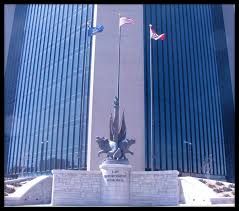
City Hall
City government is headquartered in City Hall, at a ten-story black-glass building at the southwest corner of Central Ave. and Main Street, across from the Sedgwick County Courthouse.
For official summary information about Wichita — its land, history, population, economy and infrastructure — and details about Wichita city government's administrative and fiscal matters, see this
City of Wichita "Budget & CIP Documents" web page
which contains links to the City's hefty-but-informative
"2025 Adopted Budget"
(and the
"2025 to 2034 Adopted Capital Improvement Program"
.)
The City of Wichita
"Financal Documents" web page
includes
15 previous City Budgets
).
NOTE: The budget documents commonly include
extensive charts, graphs, demographic & economic data, and city government organization information.
Return to LOCAL GOVERNMENT menu
Sedgwick County:
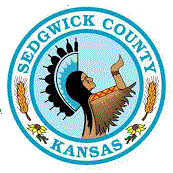 Wichita (with its adjoining suburbs) occupies about a quarter of Sedgwick County, a large, rural-and-urban county (1,008 square miles, and about 500,000 people) with many small towns (see map below).
Wichita (with its adjoining suburbs) occupies about a quarter of Sedgwick County, a large, rural-and-urban county (1,008 square miles, and about 500,000 people) with many small towns (see map below).
Most of the towns — notably Haysville, Derby, Mulvane, Goddard, Maize, Valley Center, Park City, Kechi and Bel Aire — are chiefly "bedroom community" suburbs of Wichita, mostly home to Wichita-area workers. (Also, in adjacent Butler County, to the east, are three towns closely tied to Wichita: the bedroom community of Andover, straight east of Wichita, just over the county line; and immediately south of Andover, about 5 miles, is Rose Hill; Augusta is 15 miles east of Andover. And, in adjacent Harvey County, to the north, is Newton, about 20 miles north of Wichita).
But several other towns, farther away — notably, to the west of Wichita: Sedgwick, Andale, Mount Hope, Garden Plain, Cheney, Clearwater, and Viola — are more connected to Sedgwick County's many farms.
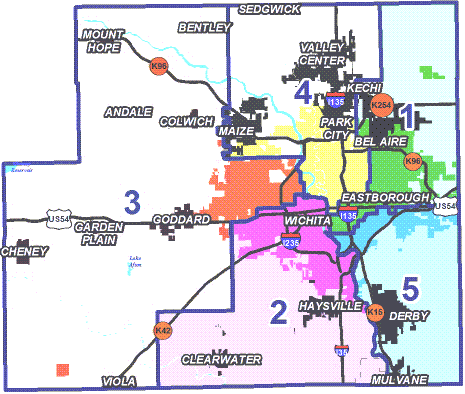
County Officials & Government Structure:
Sedgwick County is ruled by a Commission-Manager form of government.
Five County Commissioners are elected, each from a distinct geographic district (see District map above), for four-year terms, in biennial, partisan, public elections.
County Commission elections are in even-numbered years, combined with state-and-federal elections, and are staggered -- three seats in one year, two seats in another (two years later), to avoid the destabilizing possibility of a wholly new and inexperienced County Commission.
The Commissioners, in turn, annually elect the Commission's Chairman, who guides meetings, but has little exceptional authority.
(For details of recent County Commission elections,
see the:
ELECTIONS & CAMPAIGNS
section,
at the top of this page
Like the Wichita
City Council, the Sedgwick County Commission sets policy and resolves public disputes, but day-to-day operations of County government are handled by an appointed
County Manager.
However, several other County executives are elected -- though these elected officials' departmental budgets are chiefly set by the County Commission. These include:
-
County Treasurer -- responsible for administration of the County's finances.
-
County Election Commissioner -- responsible for voter registration and election administration -- who answers to both the Kansas Secretary of State and the County Commission.
 To enforce state statutes and county ordinances, Sedgwick County voters also elect:
To enforce state statutes and county ordinances, Sedgwick County voters also elect:
-
District Court Judges,
(who, as the state judges for for Kansas' 18th Judicial District -- Sedgwick County -- adjudicate cases under state laws)
-
District Attorney for Sedgwick County
(who, as the District Attorney for Kansas' 18th Judicial District -- Sedgwick County -- enforces state laws); and the
-
County Sheriff
(who supervises both the sheriff's deputies and the County Jail, which adjoins the west side of the County Courthouse) His office chiefly handles cases under state law (particularly criminal cases), but also cases under county ordinances, and District Court orders (such as evictions, seizures & impoundments, tax sales, commitments and child-custody seizures).
However, the voters do not elect the
- County Counselor
— an attorney appointed by the County Commission to serve as their legal counsel, but also to serve as the county prosecutor enforcing county ordinances.
County Offices & Buildings:
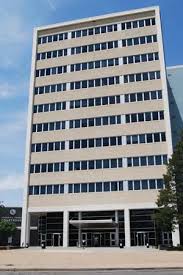 County government is headquartered in the Sedgwick County Courthouse,
a 13-story blue-and-tan building (shown at left) at the northwest corner of Central Ave. and Main Street, across from the Wichita City Hall. The tan, five-story County Jail (also used by the City), adjoins the west side of the Courthouse.
County government is headquartered in the Sedgwick County Courthouse,
a 13-story blue-and-tan building (shown at left) at the northwest corner of Central Ave. and Main Street, across from the Wichita City Hall. The tan, five-story County Jail (also used by the City), adjoins the west side of the Courthouse.
The "historic" original county courthouse, a stately limestone palace
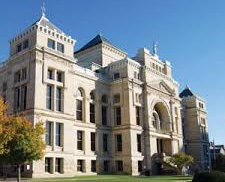 (shown at right), is on the northeast corner, across the street from the current courthouse, and is used for many county functions, as well -- most notably the Election Commissioner's office.
(shown at right), is on the northeast corner, across the street from the current courthouse, and is used for many county functions, as well -- most notably the Election Commissioner's office.
County Commission Meetings:
County Commission meetings -- open to the public -- are held in the County Commission Meeting Room in the newer County Courthouse, on Wednesday mornings... occasionally lasting into the afternoon.
The meetings are very similar to Wichita's City Council meetings (see their description in City of Wichita section, above).
County Commission meetings are often broadcast live on KPTS-TV Channel 8 (the local public television station), though the broadcast contract is dropped in some years.
County Budget:
Hovering just over $400 million, the County budget has remained fairly constant in recent years, despite increases in County population, housing, commerce and traffic.
With a majority of County Commissioners holding strong anti-tax, anti-government views, the current Commission has resisted tax and budget increases for several years, despite dwindling state aid and deteriorating infrastructure. However, in his 2017 proposed budget, the County Manager stated...
"The 2017 County Manager’s recommended budget was
developed after six consecutive tight budget years. Since
2010, total County spending, including the Fire District,
has decreased 1 percent. In the same period, demand for
County services has increased in most areas.
Departments are no longer able to do more with less."
...proposing a budget of slightly over $424 million, a $10 million increase (about 2.4%).
County Politics:
The current (2017) County Commission is dominated by Libertarian-Republicans, backed by the Koch Brothers (see "The Koch Effect," below) -- but the Commission is usually dominated by commissioners allied to the land-development industry or other commercial interests. At least one Democrat is usually elected, typically from the south-central district dominated by blue-collar factory workers.
Currently (early 2016), the County Commission has an antagonistic relationship with the Wichita City Council -- driven by a philosophical divide: Most County Commissioners are anti-government Libertarian Republicans, opposed to government subsidy of community development and commercial enterprises.
Wichita's City Council, however, is largely enthusiastic about such government activity (particularly for local "economic development"), and has -- in the past -- relied upon the County as a cost-sharing partner in such efforts. Extreme hostility to that tradition, by the current (2016) County Commission, however, has strained City-County relations extremely.
UPDATE 2018:
In the 2018 elections.
the Sedgwick County Commission's principal Libertarian, Richard Ranzau,
was defeated by a liberal Democrat, Lacey Cruse
-- likely providing a substantial shift away from the extraordinarily libertarian pressures
on the Commission, and likely lessening tensions in City/County intergovernmental relations.
UPDATE 2020:
In the 2020 elections.
Sedgwick County Commissioner Michael O'Donnell, steeped in scandal,
was defeated by a Democrat, Sarah Lopez
-- further undermining the strong conservative leaning of the
Commission, and possibly further lessening tensions in City/County intergovernmental relations.
For DETAILS & UPDATES on the
most recent County Commission election, see:
NOTE: For official, more-detailed, summary facts and data on Sedgwick County,
see this PDF:
the official Sedgwick County "County Profile".
which contains maps, graphs, demographic & economic data, and county government organization information.
NOTE: For more detailed maps of Sedgwick County Commission districts, naming individual Commissioners, by district, see:
this official Sedgwick County map site.
For more a copy of detailed demographic maps and data on Sedgwick County people, by age, incomes, race and neighborhoods, with trends for Sedgwick County and the other neighboring counties, see this slide show by Wichita State University economist Jeremy Hill:
"Demographic Shifts"
. (Note that the U.S. Bureau of the Census primarily groups and reports most census data by county rather than by city, so this is a major source of the demographic analysis of both Wichita and the rest of the county, including individual Census tracts within the area.)
For additional Sedgwick County government administrative, fiscal and economic information, see the
Sedgwick County "Recommended 2017 Budget"
.
Return to LOCAL GOVERNMENT menu
 City/County Shared Functions:
City/County Shared Functions:
City and County government, for practical reasons, share many functions -- most overseen by County Government.
These include city/county planning (through the Metropolitan Planning Commission, appointed by the City Council and County Commission), Emergency Services Dispatch (9-1-1), which dispatches Sheriff, Wichita Police Dept. (WPD),
 City and County Fire Departments (WFD & SCFD) and county-wide ambulance service (Sedgwick County Emergency Medical Service - EMS). They also share the County Jail, the Health Department. and the official local historical museum.
City and County Fire Departments (WFD & SCFD) and county-wide ambulance service (Sedgwick County Emergency Medical Service - EMS). They also share the County Jail, the Health Department. and the official local historical museum.
Though City-County cooperation has a long history in Wichita, it is often fraught with political stress, as the two governments feud over who has control, and who pays what.
Because of the frequent overlap of services, it has often been suggested that City of Wichita and Sedgwick County should merge into one large "Metropolitan" government. However, self-protective council members and commissioners -- and rural/small-town county residents fearful of being overpowered by Wichita's inevitable clout in a unified government -- have long fought against unification, quite successfully.
Return to LOCAL GOVERNMENT menu
 School District:
School District:
Unlike most cities its size or larger, all of Wichita's public schools are part of one "Unified School District" - USD 259 (one of hundreds throughout Kansas). Also officially known as the "Wichita Public Schools," the District is one of the largest single school districts in the nation, with a $650 million budget, employing over 9,000 workers, to serve 51,000 students.
The District operates...

- 9 - High schools
- 15 - Middle schools
- 3 - "K-8" schools (combined Elementary/Middle school)
- 54 - Elementary schools
- 12 - Special program sites
(Among all these schools, 24 are "magnet" schools offering specialized curriculums).
The District is ruled over by an elected School Board, who, in turn, elects their own Chairman from the Board.
Officially, in Kansas, school board elections are "non-partisan," and officials do not publicly declare a party affiliation. Membership is diverse on the 9-member board, and typically ranges from retired educators, to interested middle-class and upper-class parents of students, to local neighborhood, business and church leaders, to ambitious young politicos working their way to higher office.
An appointed school Superintendent manages the school system on a day-to-day basis. The Wichita District's headquarters have changed multiple times in recent years, and it is unwise to predict their next location.
Perhaps more than the City or County governments, the School Board is rigidly limited in their authority and actions by extensive state and federal laws governing public schools, and by the District's dependence upon state funding.
For official summary information about the Wichita Public Schools / USD 259, see this:
official "District Snapshot"
which includes extensive summary data, key facts and factors, and District organization information.
Funding Fights & Flights
 Overwhelmingly, Wichita (and other Kansas) public schools are dependent upon funding by the Kansas State Legislature (who spends roughly half the state budget on education), and even local taxes for school funding (chiefly property taxes) are tightly restricted by the Legislature.
Overwhelmingly, Wichita (and other Kansas) public schools are dependent upon funding by the Kansas State Legislature (who spends roughly half the state budget on education), and even local taxes for school funding (chiefly property taxes) are tightly restricted by the Legislature.
In recent years, a tight-fisted Governor and Legislature (largely beholden to, and guided by, the Libertarian Koch brothers), have created a growing crisis in Kansas public school funding, resulting in education cuts, statewide, and political upheaval.
As exemplified by the current state school-funding crisis, Kansas public schools (and particularly Wichita's) have struggled against various conservative movements intent on crippling, segregating or eliminating public schools — and determined to shift power and funding to private schools (particularly conservative religious schools), or to independent home-schooling.
Wichita is home to several private schools, from pre-school to high-school, populated largely by the descendants of city's most powerful citizens and religious denominations.
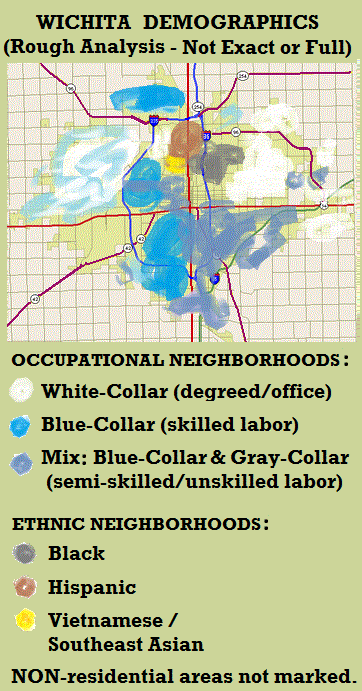
Also, like many American cities, Wichita is plagued by "white-flight" to the suburbs by parents intent on removing their children from the city's mixed-race public schools, and enrolling them in white suburban communities (particularly Derby and Haysville, to the south, Maize and Goddard to the west, and Andover to the east).
This leaves Wichita's public schools populated by the most disadvantaged students, children of the area's poorest, least-powerful people. Consequently, Wichita has the students who cost the most to educate, while doing so with an education funding base that is arguably the weakest in the county, and the state.
Add in the hostility to Wichita and its minority students from Wichita's white suburbs, and from other Kansans in general, and the Wichita public schools find themselves constantly struggling to get an "adequate" -- let alone "equitable" -- share of funding from the State of Kansas, or even from their own community, despite a state constitution that requires both.
(NOTE: In mid-2016, state funding of Kansas public schools was in crisis. In recent years, under the administration of Governor Sam Brownback, and a right-wing legislature beholden to the libertarian Koch family, state funding of Kansas schools was dramatically cut, and resulted in severe and growing hardship for Kansas public schools.
By 2016, one-fifth of the state's education leaders -- school board members, superintendents and principals -- had left their jobs in disgust. Public schools were experiencing a near-record turnover of teachers, as veterans quit in despair or were cut from tightening budgets. A shortage of teachers has developed, and several schools were being closed around the state.
 In early 2016, in an unprecedented move, the Kansas Supreme Court threatened a Summer 2016 shutdown of all public schools, statewide, unless the Legislature complied with the Kansas Constitution's requirement that public schools be "adequately and equitably" funded by the state. An emergency session of the Legislature, and grudging concessions by them and the Governor, have averted the shutdown, temporarily.)
In early 2016, in an unprecedented move, the Kansas Supreme Court threatened a Summer 2016 shutdown of all public schools, statewide, unless the Legislature complied with the Kansas Constitution's requirement that public schools be "adequately and equitably" funded by the state. An emergency session of the Legislature, and grudging concessions by them and the Governor, have averted the shutdown, temporarily.)
During the 2016 election campaign, Brownback backers and other conservatives funded a lavish and unprecedented campaign to unseat Kansas Supreme Court justices, who had ruled against Brownback on the pivotal and costly school finance issue.
However, the effort failed, completely and overwhelmingly, due in part to opposition from both law enforcement supporters and
all four still-living previously elected Kansas governors (two of each party) who called the effort a "power grab" by unpopular Gov. Brownback.
Furthermore, aggressive campaigns by moderate Republicans, and by Democrats -- largely over the school finance issue -- resulted in the unseating of 40 of the radical-right legislators who had backed Brownback, replacing them with either moderate Republicans, or with Democrats, shifting power in the Kansas Legislature away from the radical-right Republicans, towards moderate Republicans.
(For details of the outcome, see analysis and opinion essay by WSU Public Administration Prof. Ed Flentje, former Kansas Secretary of Administration to Republican Governor Mike Hayden, at:
"Kansas voters rebuke Brownback, tax plan"
November 12, 2016, Wichita Eagle.)
Also see:
"Conservative Lawmakers Ousted in Kansas Primary Election: GOP races seen as referendum on Gov. Sam Brownback’s tax-cut policy"
Aug. 3, 2016, Wall Street Journal
(For more, see "The Koch Effect," below.)
UPDATE: Summer 2019:
The defeat of Koch-backed Republicans in 2016 and 2018 elections -- and the Nov. 2018 election of a Democrat as Governor -- resulted in a sharp reversal of state fiscal policy, particularly towards public school funding.
By the Summer of 2019, the school-funding crisis and controversy was largely brought to an end,
and the Kansas Supreme Court accepted the Legislature's enactment of new school-funding policy (and funds) as adequate to satisfy the Court's demand that state government comply with the Kansas constitutional requirement for "full and fair" funding of Kansas public schools.
However, the Court decided to keep the decade-old case open, for the time being -- in case the Legislature, or Governor, might renege on their commitment to the settlement.
For official financial and budget information about Wichita Public Schools,, see this
Wichita Public Schools "Finance" web page
which contains the District's "2017-2018 Proposed Budget," 2016 approved budget, and other related documents. Earlier budgets can also be found on this page.
Performance

The District, in 2016, reported a 75.3% graduation rate -- one of the lowest in the state (though the District reported that this was a 19% increase over the rate 6 years earlier). This reflected three key problems facing the district, as well as others:
-
An urban population (largest in the state), with disproportionate percentages of poor and minority students, and immigrants.
-
White-flight and wealth-retreat into suburban and private schools — leaving the least-powerful parent-constituents, and the most disadvantaged students, for the Wichita public schools to serve.
-
Inequitable school funding by the Kansas Legislature, denying Wichita its "fair share" of state school funding (the main source of funds for Kansas public schools). NOTE: This factor has been repeatedly identified and verified, by findings and rulings of the Kansas Supreme Court (see above).
Teacher Power

Wichita public school teachers are largely represented by the K-NEA -- Kansas Chapter of the National Education Association (NEA), the nation's leading teachers' union. However, in this right-to-work state, where union membership cannot be made mandatory — and where public education is under constant (and growing) political attack — K-NEA has had relatively little success in maintaining any security for Wichita's teachers, let alone advances.
The real power for Wichita educators comes from the extraordinary political activism of individual teachers -- who play a major role in state and local politics. Current and retired educators are among the chief occupational groups in the Kansas Legislature, and -- far out of proportion to their numbers in the population -- teachers are activists and leaders in Kansas' state and local political organizations.
(For more on Wichita's schools and colleges, see the
"EDUCATION"
section of this website's
LIVING page.)
Return to LOCAL GOVERNMENT menu
STATE GOVERNMENT
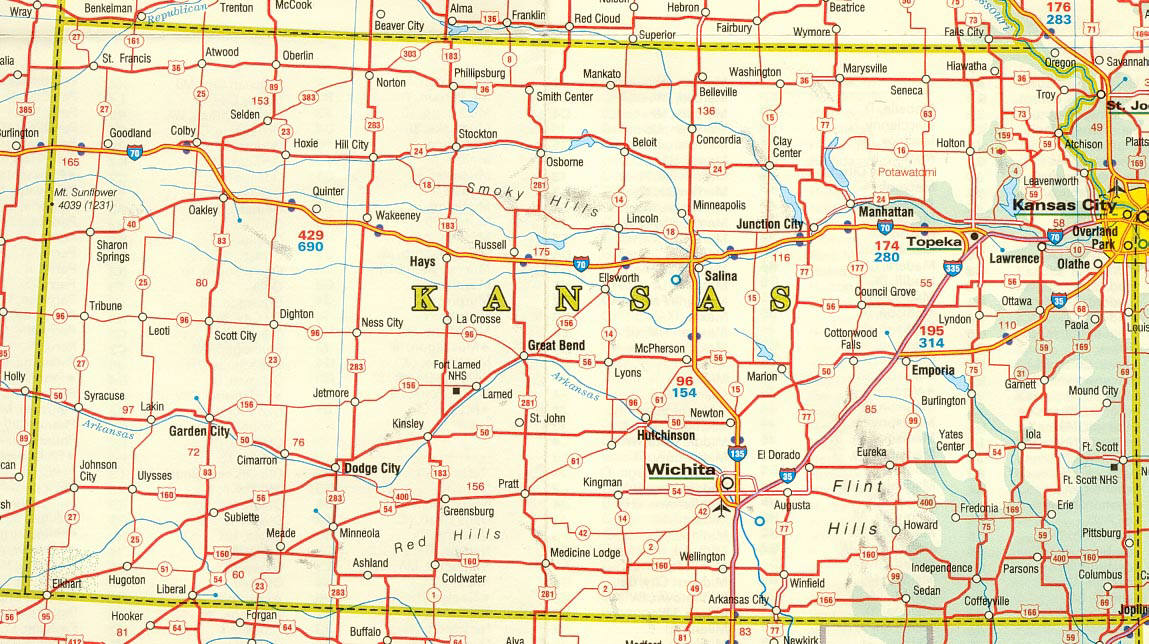
Kansas state government has profound impact upon the affairs of Wichita. Kansas state laws largely govern Wichita business and finance, criminal justice and law-enforcement, civil rights, and the financing and operation of all local government.
The radical transformation of Kansas government, in recent years, though the efforts of Wichita's Koch brothers, and the candidates they generously, decisively fund (directly and indirectly), has brought a shock to government and society throughout the state -- particularly in Wichita. Understanding these extraordinary changes, in the state capital, Topeka, is critical to understanding Wichita politics and government, today.
 Kansas Politics & Elections
Kansas Politics & Elections
Kansas Politics - Partisan Divides
Kansas has traditionally been viewed as "the most Republican state in the nation" — having voted for only two Democrats for U.S. President (Franklin Roosevelt and Lyndon Johnson, in their respective national landslides) in the last hundred years.
(NOTE: That reputation has softened somewhat in recent decades, as white American Southerners have dumped the Democratic party over the issue of civil rights, and switched, passionately, to the Republican party -- making America's South even more firmly Republican than Kansas.)
Though Kansas frequently votes for Democrats for governor, it does so less than half of the time -- more often choosing a Republican governor.
However, the Kansas Legislature has long been solidly in the control of the Republicans, who have held a majority in both the Kansas House of Representatives and the Kansas Senate for nearly all of the last half-century (a notable exception occurred when Democrats took the House for a couple of years in the 1990s).
However, this does not make Kansas politics so simple. As shown in this 2010 graph of Kansas voters, Kansas has a high percentage of unaffiliated voters, who can -- and often do -- swing to the left, and give Democrats, or very moderate Republicans, seats normally held by more-conservative Republicans.

Recent national and regional trends, however, have seen a rise in populist Republicans, loosely allied under the label "Tea Party." Their politics have been more Libertarian than Republican, often dismissing Republicans' traditional fuss over personal morals, while campaigning passionately against taxes, regulations, ethnic minorities, and foreigners. Kansas has been among those heavily affected by that trend.
In Kansas, perhaps more than any other state, the unorganized Tea Party has arguably been largely co-opted by the state's (and Wichita's) most famous billionaires, the Koch brothers, whose well-funded Libertarian politics have had a sweeping effect on the state.
With the repeated failure of the Libertarian Party to gain a significant number of votes -- locally, state-wide or nationally (as shown in the above 2010 graph of Kansas voters) -- the Libertarian Kochs helped Libertarian Party candidates to "re-brand" themselves as "Republicans," (especially "Tea Party" Republicans).
The Kochs then used their wealth to ensure dominance of their "Tea Party" candidates in Republican primary elections -- gradually making Libertarian-minded politicians the leaders of the rival Republican Party, at least in Kansas.
UPDATE: November 2016:
In the 2016 primary and general elections, voters voted a backlash against Governor Sam Brownback and his Libertarian-style "Kansas Experiment" (extreme tax cuts -- favoring the wealthy and businesses -- and resulting drastically reduced state services and crumbling state finances), which was blamed (directly or indirectly) for much of Kansas's conspicuously under-performing economy and deteriorating standard of living.
While Brownback, himself, was not up for re-election, his key supporters -- like-minded Tea Party conservatives in the Kansas Legislature -- suffered exceptional losses. The outcome led to a reversal of fortune of the Koch-backed Republicans -- with many of them being ousted, leaving Governor Brownback facing a Legislature no longer dominated by like-minded Libertarian-Republicans, but rather by moderate Republicans and Democrats, determined to roll back much of his "experiment" in the coming 2017 Legislative Session, starting in January.
UPDATE: June 2017:
LEGISLATURE KILLS GOVERNOR'S "KANSAS EXPERIMENT"
Governor Sam Brownback's "Kansas Experiment" is officially over. The Kansas Legislature, after years of battling with him over drastic tax cuts the Governor promoted in 2012, finally succeeded in mustering enough votes to override the Governor's constant vetoes of bills to restore the taxes that the state was failing to function without.
After 6 years of protracted battle over the state's radical 2012 income-tax cuts (the main legislative program pushed by Republican Governor Sam Brownback as his "Kansas Experiment"), and the resulting state fiscal crisis -- with the Kansas economy still consistently lagging surrounding states (despite the Governor's assurances that drastic tax cuts would boost the economy) -- the Republican-dominated Kansas Legislature (tempered by recent elections that cost Brownback's supporters dearly, and added new Democrats to the Legislature) finally had enough, and voted to override the Governor's threatened veto of a $1.2 billion tax hike that even the Republican Senate Majority Leader, Jim Denning (R-Overland Park), conceded was long overdue.
The 2012 tax cuts, which Brownback described as the "March to Zero" were initially planned to be the start of a move to eliminate state income taxes completely. But they initially gave large tax breaks chiefly to those in higher income brackets, and particular exemptions for small businesses (LLC companies -- making Kansas the only state to fully exempt them) and farmers (the state's chief industry).
Brownback assured the public that the drastic tax cuts would stimulate the Kansas economy, resulting in sufficiently greater income to the state from a rising economy. Just the opposite happened. Though the Kansas economy slowly improved, slightly, Kansas fell far behind surrounding states, and the nation, in its rate of recovery from the Great Recession.
The cuts created major fiscal headaches for the state -- and attempts to cut spending enough to offset the tax losses proved intolerable to the public, and the Legislature. And to the Kansas courts, which ruled, time and again, that the Legislature was failing to meet its largest financial obligation: the funding of public education, mandated by the Kansas Constitution.
The state, according to Rep. Larry Hibbard (R-Toronto) had become a national laughing stock, with employees sometimes paying taxes while their employer didn't.
Backing Senate Bill 30, Tuesday, just after midnight, the Senate voted 27-13, and the House voted 88-31, to override the veto. Both houses are controlled by Republicans. Not only moderate Republicans, but several conservative Republicans, voted for the override.
At present, however, it is unclear if the Kansas Supreme Court will validate, as adequate, the recently increased funding allotment for schools planned by the Legislature.
(See:
THE KOCH EFFECT
,
below).
Kansas Elections - State vs. Voters

Until the last few decades, Kansas (and Wichita-area) voters have enjoyed a functionally impartial election system, reliable polls, and trusted outcomes from elections.
However, starting in the Reagan/Bush presidencies in the 1980s, Republican strategists realized, with alarm, that changing demographics and politics, nationwide, was foreshadowing the end of electoral victories for the Republican party.
To hold on to power, and forestall the inevitable shift, Republican leaders and operatives began an aggressive focus on capturing the seats of the state and local officials (typically Secretaries of State and local Election Commissioners) controlling the nation's elections.
Emboldened with initial success in this effort, the GOP strategists and analysts began prescribing and encouraging various alterations to the voting rules and practices of the nation's electoral systems. Though ostensibly intended to make elections "more fair" or "easier" or "more secure," or to "prevent voter fraud," the measures were rather transparently designed to disadvantage the Democratic party and its candidates.
The new Secretaries of State, and new Election Commissioners, began to alter the turnout at the polls by making it harder to register to vote (and stay registered), harder to find one's polling place, harder to get in, or longer waits to vote (especially in Democrat-leaning districts), and various other schemes to improve the odds for Republican candidates — with disturbingly effective results.
One of the states to most aggressively enact such measures was Kansas, initially under Secretary of State Ron Thornburg, and then — quite dramatically — under Secretary of State Kris Kobach (pronounced "KO-bock").
Kobach began establishing elaborate, cumbersome procedures for voter registration and voting — procedures that he claimed would prevent "massive voter fraud" — without any evidence that any significant amount of fraud had been happening.
The real effect, of course, was to make it more difficult for young, poor and minority voters — disproportionately Democrats — to get, and stay, registered to vote... and then get their vote correctly cast and recorded.
Despite testimony and evidence (and common-sense awareness) that such voters were more-likely than other voters to change addresses, requiring re-registration, and less likely to have affordable and ready access to the required documents (particularly birth certificates) — and over the vocal protests of minority representatives — the Republican majority in the Kansas Senate voted to approve Kobach's "red-tape" complications to voting in Kansas — a move conspicuously reminiscent of anti-black, voter-suppression laws in America's segregation-era Deep South.
Kobach managed to get the Republicans in the Legislature to enact extensive state statutes, establishing complex and demanding voter-identification procedures, and authorizing Kobach broad powers to investigate, arrest and prosecute anyone "suspected" of "voter fraud."
Kobach's voter-suppression efforts seemed successful (for instance, in Wichita's 2015 city elections only 16% of registered voters voted), and Kobach has since spent much of his time traveling the U.S. (often by official state aircraft), consulting with the Republican leaders in other states on how to enact such measures in their states, as well. Georgia, in particular, adopted most of his programs, with similar outcomes.
A string of lawsuits followed, — chiefly sponsored by the Democratic establishment, and the U.S. Department of Justice under Democratic President, Barack Obama.
Their victories, mostly in federal court, weakened — but did not completely curtail — the extensive Kobach voter-suppression effort.

See: "Kobach gets Supreme Court setback on voter citizenship law, vows to fight on,"
June 29, 2015,
The Wichita Eagle
The strongest ruling came in 2016, from the Republican-dominated U.S. Supreme Court, ruling that a Kobach bill to restrict voter registration in state elections — by requiring voters to fill out a different state voter registration form, to vote on state officials, than for federal elections — was mostly illegal.
However, the Kobach election system remains at least partially intact, and Kansas elections are arguably showing the results. Only a second-term blow-back against his
extremely unpopular colleague, Governor Sam Brownback, seems able to reverse the electoral progress made by Kobach's Democrat-suppression system.
See:
"From suppression to fraud:
Voting obstacles of 2018"
2018 election season -
Wichita
Eagle
UPDATE: 2017:
Kobach's nationally noted voter-suppression programs attracted the attention of President Donald Trump, who had complained that his own loss of the popular vote (he won the presidency by the technicalities of the Electoral College, while over 3 million more voters voted for Trump's Democratic opponent, Hillary Clinton) was because "three million votes" were "illegal" -- largely from illegal aliens, Trump claimed.
Looking for evidence to support his "voter fraud" claim, Trump created a commission to "investigate" the U.S. electoral process, and appointed Kobach to head it (while Kobach remained Kansas Secretary of State).
As head of the Presidential commission, Kobach initiated some controversial actions, including asking all states to provide detailed information on their registered voters -- information that, ironically, was illegal to divulge even in Kobach's own state. Most states refused or failed to respond, and Kobach's commission, despite various efforts, failed to find evidence of the "widespread" voter fraud that Kobach and Trump had loudly claimed existed.
Trump quietly closed the commission, and Kobach returned to Kansas to finish his term as Secretary of State -- and run for Governor.
UPDATE: October 2018:
In the 2018 race for the Republican nomination for Kansas Governor, Secretary Kobach (by a margin of one-third of one percent) narrowly defeated Gov. Brownback's successor, interim Governor (former Lieutenant Governor) Jeff Colyer, who is finishing out Gov. Brownback's unexpired term. (Gov. Brownback resigned to join the Trump administration in Washington, D.C.). Secretary Kobach is (as of Autumn 2018) in a close race against Democratic legislator Laura Kelly, for the Governor's office. An independent candidate, businessman Ron Orman, is running also.
See:
"Kobach is Republican nominee for Kansas governor after Colyer concedes."
Aug.14, 2018,
Kansas City Star
"Brownback's political limbo puts Kansas in 'awkward' situation"
2017-11-26
Kansas City Star
UPDATE: Nov. 5, 2018:
In the 2018 race for Kansas Governor, State Senator Laura Kelly (Democrat) won
with 48% of the vote --
defeating Kansas Secretary of State Kris Kobach (Republican), who got 43% of the vote -- as well as three other candidates, who split 9% of the vote (6% to independent candidate and businessman Greg Orman, 2% to Jeff Caldwell, and 1% to Rick Kloos).
(See "Kansas Governor & Administration" section, below.)
For more information on the Kansas 2018 election campaign & results, see:
Kansas Politics - Other Factors
For information on a peculiar Kansas factor shaping Kansas electoral politics, see the section below, titled:
"ONE MAN -- MANY VOTES"
— then return here for more on Kansas government & politics.
Kansas Governor & Administration
In Kansas, the Governor is the Chief Executive of the State, and the official manager of the state government administration -- with very broad and deep powers.
Kansas elects a Governor for a four-year term (maximum of two terms) on the even-numbered years between U.S. presidential elections. He/she cannot be recalled, normally, but can be impeached and convicted of crimes by the Legislature.
Kansas usually elects a Republican governor, but almost as often chooses a Democrat -- an irony in a state that is overwhelmingly Republican in almost every other level of office.
The last few governors -- Republican (R) or Democrat (D) -- (in reverse order, from most recent) have been: